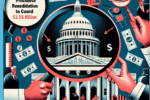Title: NCAA Imposes Sanctions on Tennessee Football Program for Violations Under Jeremy Pruitt
Introduction:
The NCAA has levied significant penalties against the University of Tennessee for numerous violations committed by its football program under former coach Jeremy Pruitt. While the Vols managed to avoid a bowl ban, they have been fined $8 million, placed on probation for five years, and will face scholarship limitations and restrictions on unofficial visits. The violations, which include illegal payments to players and the improper arrangement of visits for recruits, were deemed to have created a culture of non-compliance within the football program. However, Tennessee’s cooperation throughout the investigation was commended by the NCAA.
Section 1:
Under the sanctions, Tennessee will face a reduction of 28 scholarships, although the program had already self-imposed a penalty of 18 scholarships. Additionally, the university will be required to vacate all wins and records in which 16 sanctioned players participated. The violations primarily involved the payment of approximately $60,000 to players and the improper payment of recruits’ unofficial visits. Notably, the recruiting staff concealed these activities from the compliance department, and there were concerns raised about the culture within the football program.
Section 2:
The NCAA Committee on Infractions’ chief hearing officer, Kay Norton, expressed particular concern with the culture of the football program, stating that the compliance environment had been at odds with the association’s expectations for several years. Norton further mentioned that young staff members felt reluctant to report violations due to fears of retaliation. Additionally, Tennessee arranged nine visits for recruits and their families during the COVID-19 shutdown, when recruiting activities were prohibited. Coaches on the team paid for these visits and occasionally enlisted current players as hosts.
Section 3:
Jeremy Pruitt, the former head coach, received a show-cause order for six years, which includes a mandatory one-year suspension if hired in any athletically related position. A show-cause order is the most severe penalty a coach can face under NCAA regulations. The order requires any school hiring Pruitt to appear before a committee every six months to demonstrate compliance with NCAA rules. Former defensive coordinator Derrick Ansley received a two-year show-cause order, while Bethany Gunn, the former recruiting director, and Chantryce Boone, the assistant recruiting director, received five-year and ten-year show-cause orders, respectively. All three individuals are no longer working in college football.
Section 4:
The NCAA also upheld previously self-imposed show-cause orders for other staff members, including assistant coaches and a student assistant. Tennessee will face restrictions on communication with recruits and hosting unofficial visitors, along with a decrease in official visits and evaluation days over the probationary period. The investigation was initiated by an athletic department staffer who overheard conversations about players receiving payments. The subsequent inquiry unearthed numerous violations, which led to Pruitt’s dismissal in January 2021.
Section 5:
Despite the serious nature of the violations, the NCAA applauded Tennessee’s cooperation throughout the investigation and response to the misconduct. According to the panel, the university’s response is one that all institutions should strive to emulate. The extent of the cooperation played a role in Tennessee avoiding a postseason ban. These sanctions serve as a reminder of the importance of upholding standards in college athletics and the potential ramifications of non-compliance.
In conclusion, the University of Tennessee’s football program faces significant penalties imposed by the NCAA for numerous violations committed during Jeremy Pruitt’s tenure as head coach. The program will need to navigate five years of probation, substantial fines, scholarship reductions, and limitations on recruiting activities. The sanctions shed light on the need for institutions to ensure a culture of compliance within their athletic programs while serving as a blueprint for other schools to follow in mitigating potential infractions.










